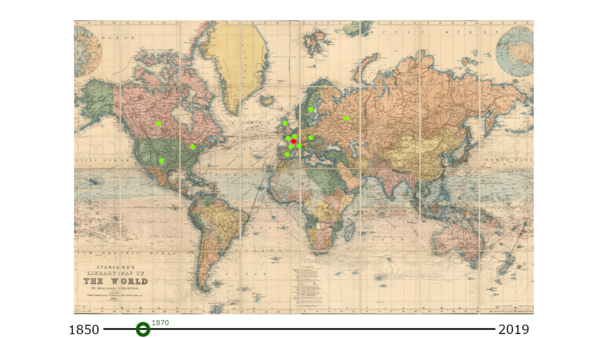Sketch of Artwork origins in Paris: Difference between revisions
No edit summary |
|||
| (One intermediate revision by the same user not shown) | |||
| Line 10: | Line 10: | ||
== Illustration == | == Illustration == | ||
Here, we show how the data could be presented at a worldwide scale. The red dot indicates Paris and the green ones the countries (or even the cities) from which the artworks come from. Since precise location data won't always be available, we will need to choose if we simply take the country of the author (i.e. we assume a particular piece has been created in Italy if the author is Italian) or adopt a different convention. | Here, we show how the data could be presented at a worldwide scale. The red dot indicates Paris and the green ones the countries (or even the cities) from which the artworks come from. Since precise location data won't always be available, we will need to choose if we simply take the country of the author (i.e. we assume a particular piece has been created in Italy if the author is Italian) or adopt a different convention. | ||
[[File:Pr2sketch.png|800px|thumb|center|600px|Artwork origins in Paris at a worldwide scale]] | |||
== References == | == References == | ||
Latest revision as of 09:08, 2 October 2019
This is the sketch of the project Artwork origins in Paris by Andrea Scalisi and Giacomo Alliata, EPFL 2019.
Description
The goal of this project is to visualise on a world map the origin of the artwork in Paris through time. Depending on the available data, we might focus only on the Louvre Museum or on several museums in Paris.
This would also allow to analyse how the collections of those museums have changed over time. For instance, we expect a prevalence of European artworks at first before an expansion to the rest of the world in the last centuries. There might also be a correlation with wars, as it is known several artworks were stolen during conflicts.
Depending on the data, several layouts may be shown, such as at different scales (first at national scale, then at european scale and last worldwide).
Illustration
Here, we show how the data could be presented at a worldwide scale. The red dot indicates Paris and the green ones the countries (or even the cities) from which the artworks come from. Since precise location data won't always be available, we will need to choose if we simply take the country of the author (i.e. we assume a particular piece has been created in Italy if the author is Italian) or adopt a different convention.
